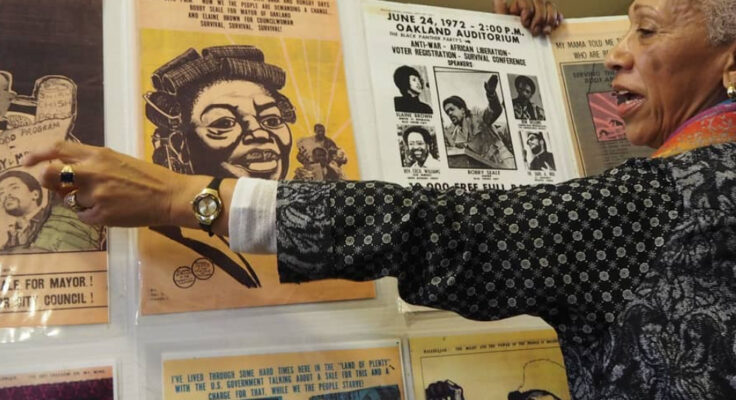The Kenneth Rainin Foundation hosted virtual discussions to create a space for peer learning and exchange for practitioners working in the public realm. This four-part series took place in August 2021 and convened City of Oakland and San Francisco representatives, as well as artists and past Open Spaces Program grantees. Conversations explored the opportunities and challenges of working in the public realm, including managing complex partnerships, building relationships with community members, and working with city agencies. What resulted were exchanges that emphasized how rich and complex this work can be.
We are sharing the four recordings below to support those wanting to work in public art or those who are interested in applying to our Open Spaces Program. This grantmaking program supports temporary, place-based public art projects that are responsive to issues relevant to communities in San Francisco and Oakland.
Block By Block: Building Community Through Time, Space & Change
Watch the video recording of “Block by Block.” Video still image shows Saturu Ned an educator and former member of the original Black Panther Party and the Black Panther Party Alumni Network.
A core part of the Rainin Foundation’s Open Spaces grant program is supporting projects that center community engagement. In this first workshop, Sue Mark, artist and cultural researcher at marksearch, and Saturu Ned, educator and former member of the original Black Panther Party and the Black Panther Party Alumni Network, discussed “Commons Archive,” which received an Open Spaces Program grant in 2019. Initiated in 2013, this grassroots history project is addressing the dissolution of neighborhood networks by displacement and gentrification. By engaging residents of North Oakland’s Golden Gate neighborhood, “Commons Archive” preserves and presents stories that illuminate the rich history of the neighborhood, its culture, people and institutions.
“We’ve been strategizing on ways to support neighbors on a very localized block level to continue to build relationships…”
Sue Mark, Artist
Producing In Public Space: Partnering With City Agencies
Kristen Zaremba, Zoë Taleporos, and Allison Cummings, representatives from the cities of San Francisco and Oakland, discussed how to work with city agencies on producing temporary public art projects. They shared tools for permitting, approval processes, and other resources for catalyzing public art projects. In addition, Allison Cummings gave us a view into the City of San Francisco’s Monuments and Memorials Advisory Committee, which examines the city’s history of monuments, and the potential opportunity for temporary interventions on public property.
“Our main focus is to put artists at the forefront of the discussion about how we can improve and engage people in public space in Oakland and to reinforce and engender a sense of belonging…”
Kristen Zaremba, City of Oakland Cultural Affairs Division, Economic & Workforce Development
In/With/For the Public: Reflections on Engaging Community & Producing During The Pandemic
Projects in public space often have to be flexible to meet various opportunities and challenges, especially in pandemic times. This session opened with an exercise led by queer migrant poet, cultural organizer and social justice activist Sonia Guiñansaca. They guided participants in reflecting on the communities they are a part of and that they hope to serve through their public practice, and what it means to intentionally and nonextractively engage community.
Following this exercise, artist Alleluia Panis discussed KULARTS’ “Lakbai Diwa: Diasporic Spirit,” which was funded by an Open Spaces Program grant in 2019. “Lakbai Diwa” was created in partnership with the Filipino American Development Foundation and over 35 participating Diasporic and Pilipinx artists and cultural practitioners. The multidisciplinary project prompted visibility and collective healing through centering ancestral displays of spirituality and contemporary diasporic issues of survival and resilience. Panis reflected on the challenges of producing during the pandemic, calls for racial justice, and the rise in hate crimes against Asian communities, all while navigating issues ranging from community safety to complex permitting processes.
“The site-specific ceremony draws awareness to not just our culture, not just our people, but our physical presence.”
Alleluia Panis, Artist
Learn more about Sonia Guiñansaca’s work by reading their reflection in “Art Practical’s” In/With/For the Public, a thematic issue that invited artists to examine how the boundaries of public art might be expanded.
Y BASTA YA (ENOUGH)!: Partnerships For Community Power & Healing
Supporting partnerships between artists and organizations is another core aspect of the Open Spaces Program. In this final conversation, Debby Kajiyama and José Ome Navarette Mazatl from NAKA Dance Theater (NAKA) joined Maria Jimenez and Martha Sanchez from Mujeres Unidas y Activas (MUA) to discuss “Y BASTA YA!”. This multidisciplinary project, funded by an Open Spaces Program grant in 2020, builds upon two decades of work and is based on Indigenous and Latina immigrant stories that explore issues of patriarchy, systematic gender violence and invisibility. In this discussion, held primarily in Spanish, Debby, José, Maria and Martha shared how they center language justice in their work with Spanish and Mam speaking communities. Additionally, they discussed how they balance creative and programmatic goals in service of amplifying power and healing in this community of women survivors.
“Es una inversión, o sea ofrecer justicia del idioma o integrar a este movimiento a nuestro trabajo, a mujeres monolingües o o de alguna cultura diferente.”
Maria Jimenez, Mujeres Unidas y Activas

